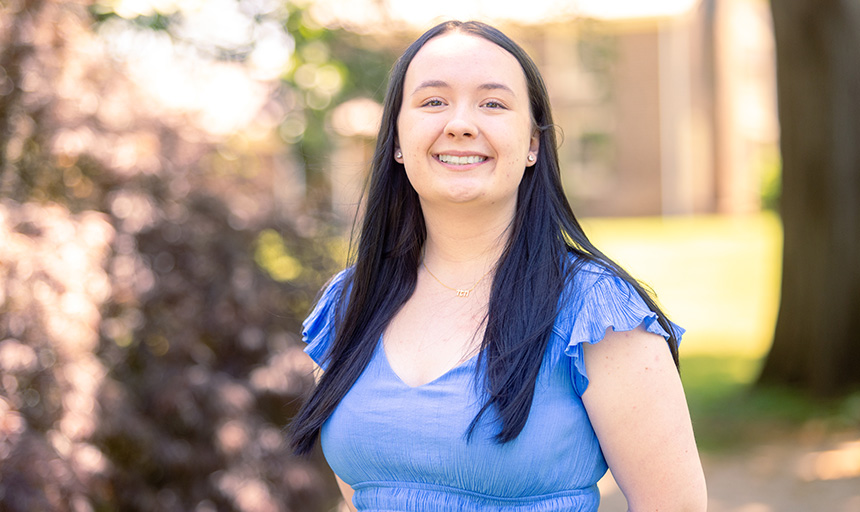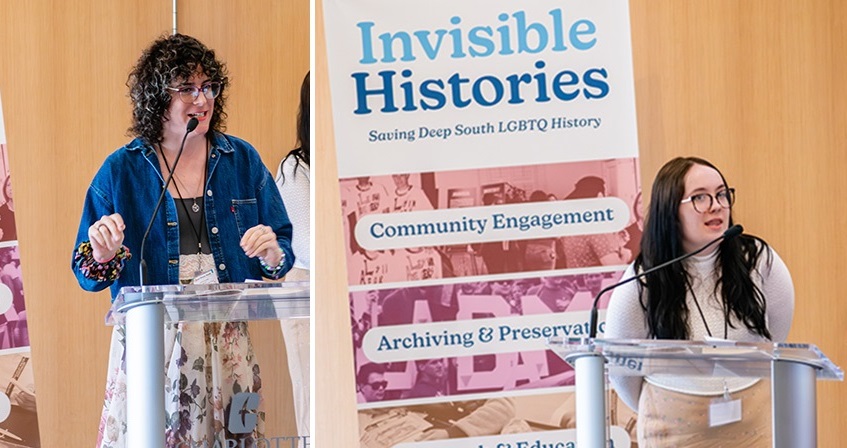History major taking research from archives to airwaves in podcast project
April 30, 2024
Category: Real-World Learning

Being a historian is like learning to see with X-ray vision. On the surface, you get one view of the world and the people who populate it. Then, you learn to look deeper.
And that’s where you find the real story.
“There’s so much history that doesn’t get told enough,” said Jayde Mooney ’25, a history major with a concentration in public history. “You need to strip away the layers to find it. That’s an important thing I’ve learned at Roanoke. That there’s always more there than meets the eye.”
Mooney was recently invited to speak at a conference with her research advisor, Associate Professor Samantha Rosenthal, on their work to document an often-overlooked part of our past: LGBTQ+ history in Southwest Virginia.
It’s a focus that has spurred Mooney, who grew up in Southwest Virginia’s coalfields, to look at her own understanding of the region through a new lens. She’s now recording a one-episode podcast special examining the experiences of LGBTQ+ teens in past and present day.
“I didn’t know how passionate I would become about this until I started doing it,” Mooney said of the podcast, for which she’s writing, editing and doing original interviews. “It’s a labor of love. I get to amplify voices that might not have been heard otherwise. I also get to better understand the people who came before me.”
The podcast, set to be released at the end of the academic year, began to take shape last fall when Mooney was invited to be a research assistant for the Southwest Virginia LGBTQ+ History Project, a multifaceted community initiative co-founded by Rosenthal.
Photos: Associate Professor Samantha Rosenthal (left) and Jayde Mooney ’25 share their research at a conference hosted by the nonprofit Invisible Histories. Credit: Invisible Histories.

In addition to research, that group works to break history out of books and classrooms to make it come alive for audiences. Offerings include walking tours, oral history recordings and a major digital archive of the region’s historic gay newsletters.
Working with Rosenthal, Mooney proposed a podcast that would draw on the history project’s archives and new interviews with local teens to explore how LGBTQ+ youth over the years found belonging, created community and processed contentious political rhetoric.
The project challenged her to dive into new technological and storytelling skills. It also offered her a real-world opportunity to work as a historian in the field.
“Learning about these principles is one thing. Getting to actually use them is a whole different world,” Mooney said. “You hold a responsibility when dealing with other people’s stories. You want to be a good narrator, which is something we talk about a lot in public history.”
For her podcast, Mooney conducted interviews with Roanoke County teens to get a firsthand perspective of modern-day youth. She was able to share some of her work for the first time when she and Rosenthal spoke at the Queer History South Network & Conference organized by the nonprofit Invisible Histories in February.
The positive response and interest in the project there were energizing, Mooney said. She’s in the process now of assembling the final cut of the podcast.
“LGBTQ+ history in Southwest Virginia is something a lot of people don’t think about. It gets overshadowed,” she reflected. “But to truly understand our community, we have to understand all of its history. There’s so much happening in this corner of the world, and its people are what make it.
“Understanding those people and their history is what makes this project so special. I feel very grateful for the opportunity to do this and to discover something I’m passionate about. I really feel like it’s set me up for what I want to do in the future.”